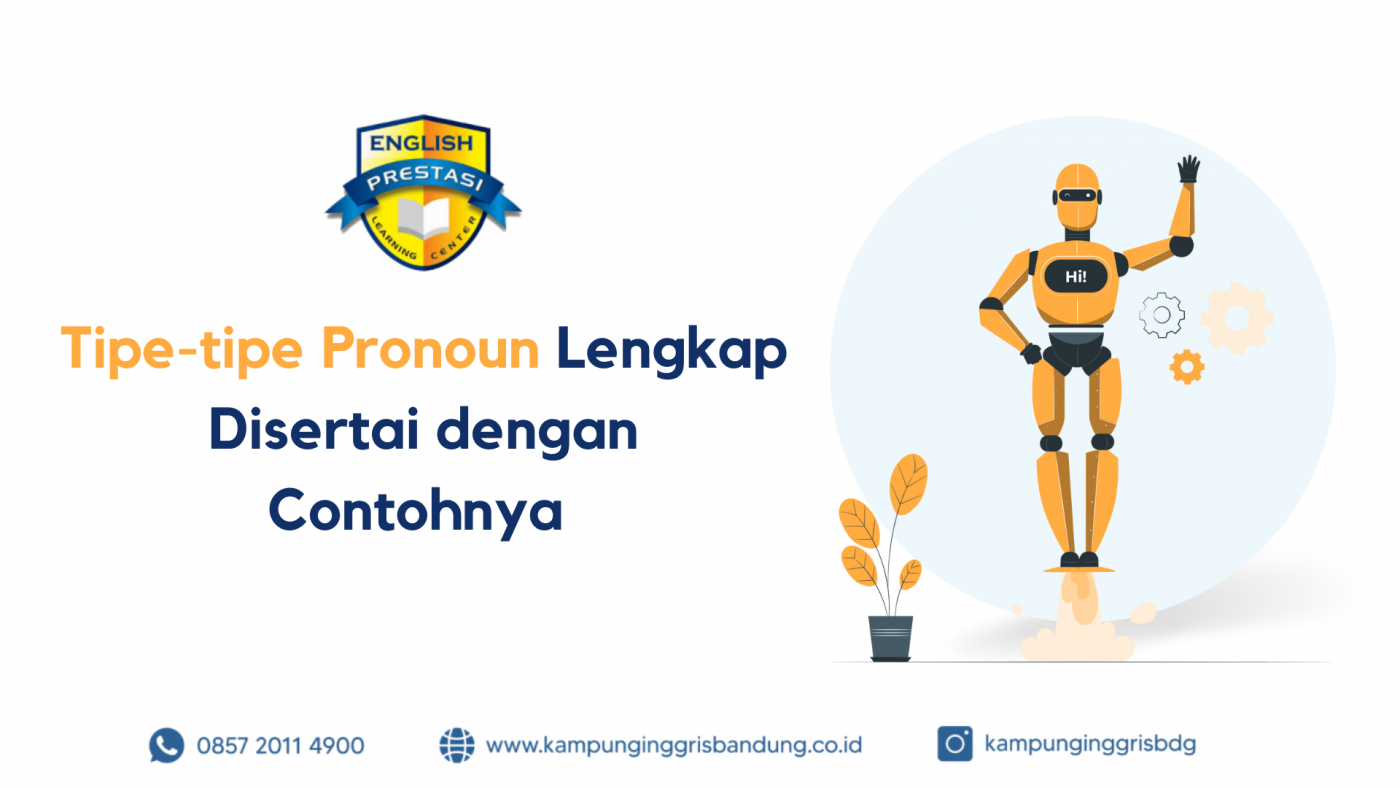Tidak ada produk di keranjang.
Grammar, Part Of Speech, Pronoun
Tipe-tipe Pronoun Lengkap Disertai dengan Contohnya
Kampung Inggris Bandung E-PLC – Pronoun atau kata ganti adalah kata yang menggantikan kata benda atau frase kata benda. Kata ganti membantu agar tulisan kita lebih bervariasi. Kata ganti dalam bahasa Inggris dapat dibagi menjadi beberapa kategori: personal, indefinite, reflexive, reciprocal, possessive, demonstrative, interrogative, reciprocal and relative. Mari kita bahas satu persatu.
Personal Pronouns
Jenis pronoun ini digunakan untuk merujuk pada seseorang, dalam kategori ini kita akan melihat kata-kata seperti I, we, you, they, he, she, …
I have green eyes.
They are coming to my house.
You are my friend.
Ada dua jenis kata ganti orang: subjek dan objek. Ketika orang atau benda menjadi subjek kalimat, maka kata ganti subjek digunakan.
Subject pronoun list: I, you, he, she, it, we, they.
I like to watch TV, but he does not.
You cannot judge a tree by its bark.
She struck him on the nose.
He studies hard to pass the exam.
Object pronouns digunakan ketika orang atu benta menjadi objek dalam sebuah kalimat.
Object pronoun list: me, you, him, her, it, us, you, them.
Sophia likes me but not him.
John will call you soon.
Don’t tell her the truth.
I helped him pull his boots off.
Reflexive Pronouns
Kata ganti refleksid adalah kata ganti yang berakhiran -self atau -selves dan digunakan untuk merujuk pada kata ganti lain. Kata-kata dalam kategori tersebut adalah, himself, herself, themselves, yourself/ves, myself, itself.
He takes care of himself.
She can do it by herself.
You could travel by yourself.
Reflexive pronouns digunakan ketika seseorang atau sesuatu bertindak untuk dirinya sendiri
Reflexive pronoun list: myself, yourself, himself, herself, itself, ourselves, yourselves, themselves.
She tried it herself.
Tom hurt himself.
Possessive Pronouns
Possessive pronouns adalah kata ganti yang digunakan untuk kepemilikian, seperti mine, yours, his, hers, ours, yours, theirs.
Do you see that woman over there? Her dog is very friendly.
Is that your house? No, ours is the one beside it.
his is my laptop. It’s mine.
These books are mine, not yours.
This is my brother ‘s book. It’s his
Demonstrative Pronouns
Kata ganti ini digunakan untuk menunjukan sesuatu, misalnya kata these, those, that, this.
These are the shoes that I am going to wear.
He likes the green flowers but he prefers those red ones over there.
I would like that one.
Kata kata dalam kata ganti Demonstratif sama dengan kata sifat demonstratif (this, that, these, and those).
This is an enormous field.
Can you see that?
These are delicious cookies.
Indefinite Pronouns
Indefinite pronoun digunakan untuk membicarakan sesuatu yang tidak spesifik. Kata-kata dalam kategori ini seperti some, all, few, none, either, one, nobody, both, each, anyone, several etc.
Nobody is going to the party.
There are several people in my class.
I like both of these photos.
Indefinite pronoun adalah kata ganti yang mengacu pada makhluk, objek, atau tempat yang tidak spesifik. Indefinite Pronouns juga dapat berfungsi sebagai part of speech lainnya, tergantung pada konteksnya.
Indefinite Pronoun List: another, anybody/ anyone, anything, each, either, enough, everybody/ everyone, everything,…
I don’t want anyone to see it.
Is there anything in that box?
You can’t blame him for everything.
Each company is fighting to protect its own commercial interests.
Much has happened since we met.
No one can cope with her in English.
Relative Pronouns
Kata ganti ini dapat digunakan untuk memberikan informasi tambahan pada sebuah kalimat. Kata-kata yang termasuk kata ganti jenis ini adalah who, which, whom…
This is my brother who lives in New Zealand.
This is the ball that my dog likes best.
Kata ganti relatif adalah kata ganti yang berhubungan dengan kata yang diubahnya dan tidak spesifik. Dalam bahasa Inggris, kata ganti relatif adalah who, whom, which, whose, and that. Mereka merujuk kembali ke orang atau hal-hal yang disebutkan sebelumnya, dan mereka digunakan dalam klausa relatif.
Relative pronoun list: who, whom, which, whose, that.
The woman who called yesterday wants to buy the house.
Now they were driving by the houses which Andy had described.
She is an artist whose work I really admire.
The author whom you criticized in your review has written a letter in reply.
Intensive Pronouns
Kata ganti intensif digunakan sebagai referensi ke kata ganti atau kata benda lain dalam kalimat yang sama sebagai cara untuk menekankannya.
The dog caught the ball itself.
Sarah cooks dinner herself.
I eat my candy myself.
Interrogative Pronouns
Kata ganti tanya digunakan dalam pertanyaan, kata-kata dalam kategori ini adalah who, which, where, how and what.
How many apples do you have?
Which way is the hotel?
Is that where the chair goes?
Reciprocal Pronouns
Kata ganti timbal balik digunakan untuk menunjukkan suatu tindakan atau perasaan yang dibalas, kata-kata dalam kategori ini one another and each other.
They are happy with each other.
The two friends really care about one another.
List of Pronouns
- Personal pronoun list. Subject pronouns: I, you, he, she, it, we, they. Object pronouns: me, you, him, her, it, us, you, them.
- Demonstrative pronoun list: this, that, these, those.
- Reflexive pronoun list: myself, yourself, himself, herself, itself, ourselves, yourselves, themselves.
- Intensive pronoun list: myself, yourself, himself, herself, itself, ourselves, yourselves, themselves.
- Possessive pronoun list: mine, yours, his, hers, ours, yours, theirs.
- Relative pronoun list: who, whom, which, whose, that.
- Indefinite pronoun list: another, anybody/ anyone, anything, each, either, enough, everybody/ everyone, everything, less, little, much, neither, nobody/ no-one, nothing, one, other, somebody/ someone, something, both, few, fewer, many, others, several, all, any, more, most, none, some, such.
- Interrogative Pronoun List: who, whom, which, what, whose, whoever, whatever, whichever, whomever.
Baca Juga: Apa Itu Pronoun? Bagaimana Aturan Penggunaanya dalam Sebuah Kalimat

